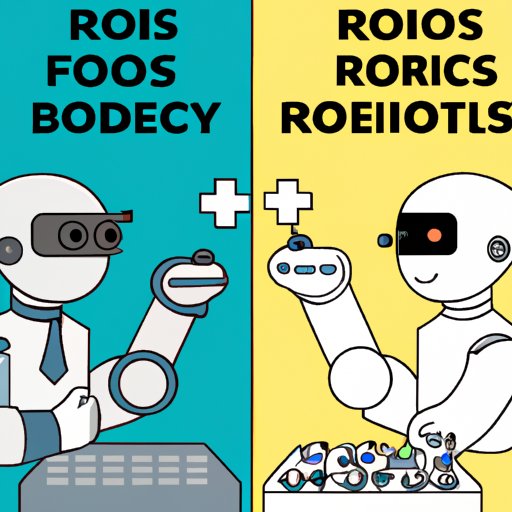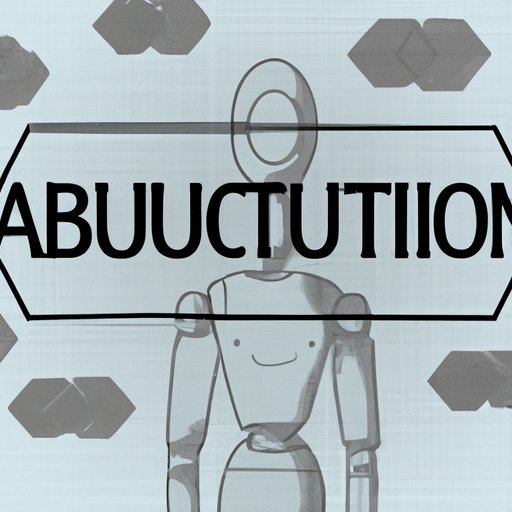Introduction
Robots are rapidly becoming a major presence in many workplaces, from factories and warehouses to hospitals and offices. But as robots take on more and more roles traditionally handled by humans, there is an increasing debate about whether this is a good thing or not. In this article, we will explore the various pros and cons of robots taking over human jobs, as well as the impact on job security, robot-proofing careers, productivity, society, and the global economy.

Exploring the Pros and Cons of Robots Taking Over Human Jobs
When it comes to robots taking over human jobs, there are both advantages and disadvantages. On the one hand, robots can be incredibly efficient and accurate, often performing tasks far faster than a human could. As Dr. John Sullins, Professor of Philosophy at Sonoma State University, states: “Robots are capable of doing things that humans simply cannot do, such as working 24/7 without breaks, lifting heavy objects without risk of injury, and performing highly precise operations with no margin of error.”
On the other hand, some argue that robots will lead to job losses, as they replace humans in certain roles. As Dr. Sullins notes: “Robots can certainly lead to job losses, particularly in industries where labor costs are high and the work is repetitive.”
Examining the Impact of Robots on Job Security
As robots become more prevalent in the workplace, it is natural to worry about the impact on job security. According to a 2019 report from the McKinsey Global Institute, automation could displace up to 800 million workers worldwide by 2030. While this does not necessarily mean that all of these jobs will be lost to robots, it does indicate that automation could have a major impact on the job market.
Robots are already replacing humans in a variety of industries, including manufacturing, transportation, retail, healthcare, and food service. For example, Amazon has deployed thousands of robots in its warehouses, while self-driving cars are being tested on roads around the world. In the healthcare industry, robots are being used for surgeries, medication delivery, and patient monitoring.
Investigating the Possibility of Robot-Proofing Your Career
While robots may be replacing some jobs, there are still plenty of roles that require human skills and expertise. To stay competitive in a robotic world, it is important to develop the skills necessary to remain relevant. According to Dr. Sullins: “Most jobs that require creativity and problem-solving are likely to remain safe from automation for the foreseeable future.”
Some of the skills that will help you stay ahead of automation include creative thinking, emotional intelligence, critical thinking, communication, and adaptability. Additionally, those who are comfortable with technology and understand how to use it to their advantage will be better prepared for the robotic future.
Comparing the Productivity of Humans Versus Robots
One of the main benefits of using robots in the workplace is increased productivity. According to a 2017 study by the National Bureau of Economic Research, replacing human labor with robots led to an average increase in productivity of 0.37 percent per worker per year. This means that businesses are able to produce more goods and services with fewer resources.
However, it is important to note that robots are not perfect and can make mistakes. They also lack the flexibility of humans, which can limit their effectiveness in certain situations. For example, robots may not be able to respond quickly to changing customer demands or new market conditions.

Considering the Impact of Automation on Society
Automation could have both positive and negative consequences for society. On the plus side, robots could help to reduce poverty and inequality by providing access to goods and services that would otherwise be too expensive for certain populations. Additionally, robots could help to improve public safety by taking over dangerous or tedious tasks that humans currently perform.
On the other hand, automation could lead to increased unemployment, as robots replace humans in certain roles. This could lead to economic instability and social unrest, as people struggle to find new sources of income. Additionally, robots could reinforce existing patterns of discrimination and inequality if not programmed carefully.

Analyzing How Automation Could Affect the Global Economy
Automation could have far-reaching economic implications. For one thing, it could reduce the cost of production, making it easier for companies to compete globally. Additionally, automation could increase global trade by reducing the need for manual labor. However, automation could also lead to job losses, which could cause economic disruption in certain regions.
There could also be challenges posed by automation when it comes to taxation. If robots are performing a large portion of the work, it could be difficult to determine who should be responsible for paying taxes. Additionally, robots may not be subject to the same regulations as humans, which could create legal issues.
Investigating the Ethical Implications of Robots in the Workplace
The use of robots in the workplace raises a number of ethical questions. For example, should robots be allowed to replace humans in certain roles? Should robots be given the same rights and protections as humans? And who should be held accountable if something goes wrong? These are all important considerations when it comes to the ethical implications of robots in the workplace.
Additionally, there may be legal issues to consider. For example, if a robot causes physical harm to a person, who is liable? Similarly, if a robot is programmed to discriminate against certain individuals, who is responsible for this? These are all important questions that must be answered before robots can be fully integrated into the workplace.
Conclusion
Robots are becoming increasingly common in the workplace, and the implications of this trend are far-reaching. While robots can offer many advantages, such as increased efficiency and accuracy, they can also lead to job losses and economic disruption. It is important to consider the potential pros and cons, as well as the impact on job security, robot-proofing careers, productivity, society, and the global economy.
In addition, there are ethical and legal considerations to keep in mind when it comes to robots in the workplace. Ultimately, it is important to weigh all of these factors when deciding whether or not to use robots in the workplace.
(Note: Is this article not meeting your expectations? Do you have knowledge or insights to share? Unlock new opportunities and expand your reach by joining our authors team. Click Registration to join us and share your expertise with our readers.)
